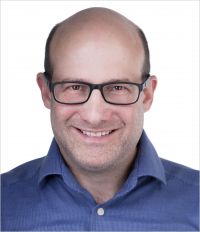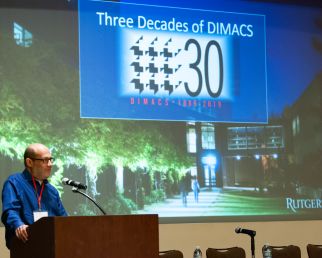January 2020
With the start of the new year and the new decade, DIMACS welcomes David Pennock as its new director. Pennock shared some of his thoughts about the history of DIMACS, becoming its new director, and future directions for DIMACS in a message that appeared in the program booklet for the Three Decades of DIMACS Conference held in November 2019.
To launch the new year, we share Pennock's remarks with the broader DIMACS community here. His message appears below.
DIMACS 2020 and Beyond: A Message from David Pennock
 For the first twenty years of my career, I admired the work of DIMACS and the incredibly talented, dedicated, effective, and kind faculty and staff running the Center. I am thrilled to start the next phase of my career as Director in January 2020. I am honored to lead an organization that I and so many people care deeply about.
For the first twenty years of my career, I admired the work of DIMACS and the incredibly talented, dedicated, effective, and kind faculty and staff running the Center. I am thrilled to start the next phase of my career as Director in January 2020. I am honored to lead an organization that I and so many people care deeply about.
In 1989, NSF and DIMACS recognized the potential of discrete mathematics and theoretical computer science to remake society. I began that year studying physics and computer science in college and then artificial intelligence in graduate school. I could feel the spreading influence of computer and mathematical sciences, but I could hardly imagine just how prescient DIMACS was. By 1999, as I began my first job, and soon became a member of DIMACS, about half of U.S. households owned a computer and society was embracing a global internet. Today, more than two billion people own a smartphone and AI is poised to make a similar-scale impact on everything from transportation to translation. Computing is the most popular major on many campuses and defines the four most valuable public companies and seven of the top ten.
DIMACS had early insight into two major factors of technological progress. First, practice benefits from theory and theory from practice. DIMACS encourages feedback between formal mathematical abstractions and their applications—often within the same team—as exemplified by its pioneering implementation challenges and academic-corporate partnerships. Second, interdisciplinary groups lead in creativity. DIMACS educates students and teachers from many backgrounds in a common mathematical language and catalyzes breakthroughs by bringing together people motivated by problems in fields like ecology, economics, engineering, environmental science, medicine, neuroscience, chemistry, physics, and sociology. Four of the major trends in computing—intelligent algorithms, data-driven programming, social computing, and ubiquitous devices—all point to an even greater importance of multidisciplinary work and education.
Through prescience, insight, adaptability, and hard work over thirty years—more than twenty under the visionary leadership terms of Fred Roberts and Rebecca Wright—DIMACS has built an incredible community of researchers, educators, students, and leaders, including representatives of and allies for traditionally underrepresented groups. If this conference is any indication, DIMACS is strong. I am humbled by the jam-packed list of distinguished speakers, the inspiring reflections, the huge support of Rutgers leadership, the input from state and federal representatives, the engagement of DIMACS partners, and the time volunteered by colleagues to contribute to DIMACS and celebrate this milestone. You, the DIMACS community, are easily the Center’s biggest asset. If you have an idea for DIMACS, my door is open: please let me know.
I am lucky to join DIMACS at a time of tremendous momentum, including major programs in data science, optimization, and education. Based on discussions with DIMACS stakeholders, including past and present leaders who I am delighted will remain deeply engaged, I plan an increasing emphasis on artificial intelligence, including the theory of machine learning, the intelligent economy, and the ethics of AI, among other topics reflecting trends in computer science, math, statistics, and operations research.
We are early in the digital age. Technology improves life on average, with some of its largest benefits yet unimagined. As we move forward, it is crucial to ensure that gains spread broadly and fairly. As Director, I plan to promote diversity, prioritize students and early-career scholars, let a thousand projects bloom, and nurture those projects showing promise to improve society or business.


